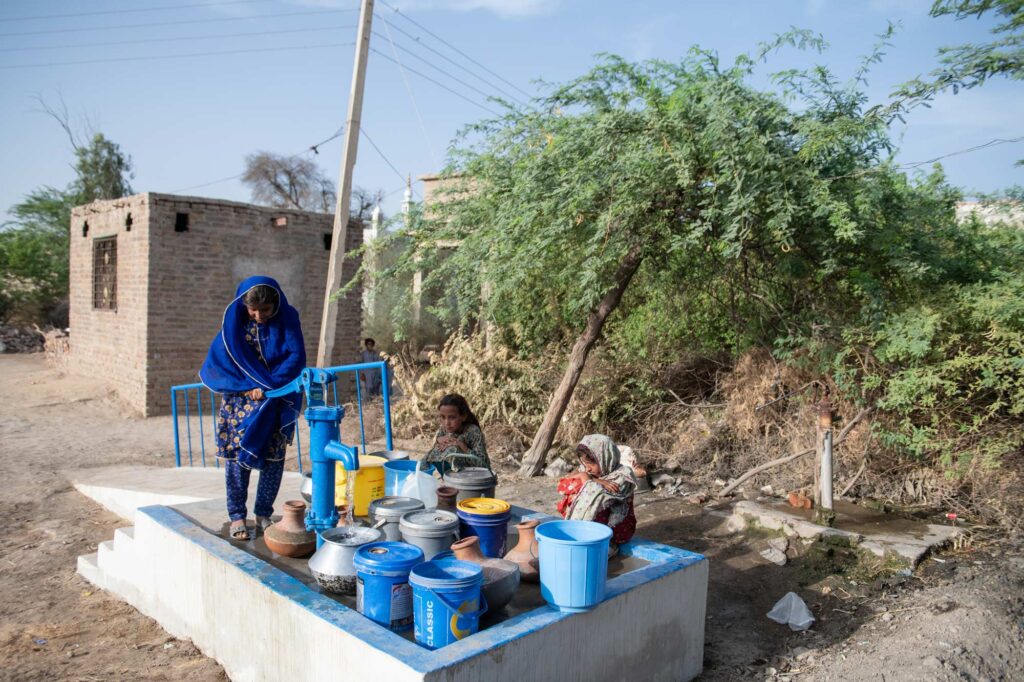
Pakistan
Pakistan is plagued by both ongoing instability and recurrent natural disasters that uproot families from their homes and destroy livelihoods. Military operations continue in the Federally Administered Tribal Areas (FATA), while floods and earthquakes are common.
International Medical Corps has worked in Pakistan since 1985, with our first programme focusing on basic paramedical training to young Afghan refugees, who then returned home to treat neglected populations. This training was extended to Pakistanis living in volatile frontier areas in 1999 and we have since responded to major disasters throughout the country. When a massive earthquake struck the region in 2005, claiming more than 70,000 lives, our medical response teams were on the scene, treating survivors, within 12 hours.
252 million
68/73 years
male/female
155 deaths
per 1,000 live births
The Challenges
Our Response
Health Services and Support
Today, International Medical Corps works in several districts of Khyber Pakhtunkhwa, Punjab and Sindh provinces, providing the following services for Afghan refugees and vulnerable Pakistanis:
- primary healthcare and essential medicines, equipment and supplies;
- mental health and psychosocial support (MHPSS);
- prevention of and treatment of violence against women and girls (VAWG)
- community education and awareness-raising about health issues;
- capacity-strengthening of healthcare providers, including in the World Health Organization’s Mental Health Gap Action Programme (mhGAP);
- WASH-related health and hygiene services;
- skills training for women through the Women’s Economic Empowerment initiative;
- capacity-building training, including basic life support, psychological first aid (PFA), mhGAP,
- VAWG core concepts, WASH-related sessions, food security and livelihoods;
- digital literacy and sustainable livelihoods programmes to help entrepreneurs manage and grow online businesses;
- youth empowerment programmes, in which participants implement small-scale, community-driven projects;
- women- and girls-friendly spaces (WGFS) where we provide a safe space for support services, awareness sessions and community engagement; and
- helplines for survivors of VAWG.
In 2024, our teams in Pakistan provided services to 340,986 people, including healthcare services, mental health care, VAWG and mental health case management, VAWG prevention and response training, awareness-raising sessions on VAWG, MHPSS, health and hygiene-related topics, and training in WASH-related interventions and in PFA and mental health case management, including mhGAP, and clinical management of rape and intimate partner violence.
International Medical Corps also successfully implemented a project to rehabilitate and solarise Expanded Program on Immunizations (EPI) centres in Shaheed Benazir Abad, one of the worst flood-affected districts in Sindh province. We rehabilitated 10 EPI centres, which now provide about 19,300 children per year with uninterrupted immunisation services. By solarising the centres, we have ensured a steady supply of power and mitigated carbon emissions.
Water, Sanitation and Hygiene
From December 2023 to November 2024, we provided essential WASH services to more than 108,000 people. Our team installed 100 weather-resilient hand pumps and rehabilitated 10 reverse osmosis (RO) plants for safe water access. We constructed or rehabilitated more than 2,000 latrines and improved WASH facilities in 30 schools and 10 healthcare centres. Our teams also trained teachers, health workers and community leaders in proper WASH procedures, provided hygiene awareness sessions to several communities and distributed 2,000 menstrual hygiene kits.
Mobile Medical Units
In Attock district, we operated two mobile medical units (MMUs) that provided essential health services to both Afghan refugees and host communities. Through our MMUs, we provided more than 8,880 consultations, including maternal health services and malnutrition screenings. Our awareness campaigns reached more than 140,000 people, while ongoing self-help groups and recreational activities continue to support psychosocial well-being. We have strengthened capacity-building efforts by providing training sessions for healthcare staff on emergency response, infection prevention and control, and PFA. We also completed renovation work on four health facilities, ensuring improved service delivery.
Tailoring Brings Financial Freedom to Women in Pakistan
Through our women’s economic empowerment (WEE) programme, International Medical Corps provides vocational training—including tailoring, sewing, dressmaking and business management—at our women’s and girls’ safe spaces.
READ MORE